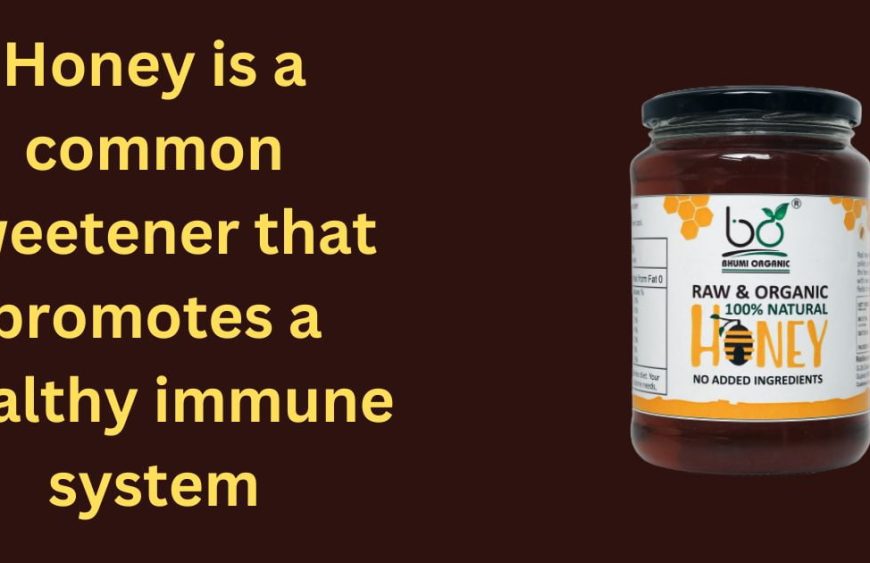When it comes to sweeteners, honey is a popular choice for many people. Not only does it add a delicious touch to foods and drinks, but it also offers numerous health benefits. Honey is not only a natural sweetener but also an excellent source of antioxidants, vitamins, and minerals. In this article, we will explore the various ways in which honey can boost your immune system and promote overall health.
What is Honey?
Honey is a thick, golden-colored syrup made by bees from the nectar of flowers. Bees collect nectar from flowers and add enzymes to it before storing it in honeycombs. The bees then fan the nectar with their wings to reduce the moisture content and turn it into honey. The flavor and color of honey vary depending on the flowers from which the nectar was collected.
Honey’s Nutritional Profile
Honey is packed with numerous nutrients, including vitamins, minerals, and antioxidants. It contains carbohydrates in the form of glucose and fructose, making it an excellent source of energy. Honey also contains small amounts of protein, amino acids, and enzymes.
Here is a breakdown of the nutritional content of a single tablespoon (21 grams) of honey:
- Calories: 64
- Carbohydrates: 17 grams
- Sugar: 16 grams
- Fiber: 0 grams
- Fat: 0 grams
- Protein: 0 grams
- Sodium: 1 milligram
- Potassium: 11 milligrams
- Iron: 0.1 milligrams
- Vitamin C: 0.1 milligrams
Antioxidant Properties of Honey
One of the most remarkable health benefits of honey is its antioxidant properties. Antioxidants are compounds that protect our bodies against the harmful effects of free radicals. Free radicals are unstable molecules that can cause damage to our cells and DNA, leading to various diseases such as cancer, heart disease, and Alzheimer’s disease.
Honey is rich in polyphenols, which are natural antioxidants that help neutralize free radicals. Darker honey varieties, such as buckwheat honey, contain higher levels of polyphenols than lighter varieties like clover honey.
How Honey Boosts the Immune System
The immune system is our body’s natural defense against disease-causing pathogens like bacteria and viruses. It consists of various organs, cells, and molecules that work together to protect us against infections and diseases.
Honey can boost the immune system in several ways. Firstly, honey has antibacterial and antiviral properties, making it an effective natural remedy against infections. It contains hydrogen peroxide, which has been shown to kill harmful bacteria and viruses.
Secondly, honey can help improve gut health. Our gut is home to trillions of beneficial bacteria that play a crucial role in our immune system. Honey contains prebiotics, which are non-digestible fibers that promote the growth of good bacteria in the gut.
Finally, honey’s anti-inflammatory properties can help reduce inflammation in the body, which is a common cause of many chronic diseases.
Benefits of Honey for Respiratory Health
Honey is an excellent natural remedy for respiratory infections such as the common cold, flu, and bronchitis. Its antibacterial and anti-inflammatory properties can help soothe a sore throat and reduce coughing. In fact, many over-the-counter cough syrups contain honey as an active ingredient.
Research has shown that honey is effective in relieving coughs in children with upper respiratory infections. A study published in Pediatrics found that children who received honey coughed less frequently and slept better than those who received a placebo or no treatment.
Honey for Digestive Health
Honey can also benefit digestive health. It has been used for centuries as a natural remedy for various digestive issues, such as diarrhea, constipation, and indigestion.
Honey contains enzymes that help break down food, making it easier to digest. It also has prebiotic properties that promote the growth of beneficial bacteria in the gut, improving overall gut health.
Research has also shown that honey can help alleviate symptoms of gastrointestinal disorders such as ulcerative colitis and Crohn’s disease.
How Honey Can Promote Skin Health
Honey can also be beneficial for the skin. Its antioxidant and anti-inflammatory properties can help reduce inflammation and oxidative stress, which are common causes of skin damage and aging.
Honey is a natural humectant, which means it can help keep the skin hydrated and moisturized. It can also help promote wound healing by stimulating the growth of new tissue and reducing inflammation.
Research has shown that honey can be effective in treating various skin conditions such as acne, eczema, and psoriasis.
Honey and Wound Healing
Honey has been used for centuries as a natural remedy for wound healing. Its antibacterial and anti-inflammatory properties can help prevent infections and reduce inflammation, promoting faster healing.
Research has shown that honey can be effective in treating various types of wounds, including burns, diabetic ulcers, and surgical wounds. It can help reduce pain, promote tissue regeneration, and prevent scarring.
Different Types of Honey and Their Health Benefits
There are many different types of honey available, each with its own unique flavor and health benefits. Some of the most popular varieties include:
- Manuka honey: Manuka honey is made from the nectar of the manuka bush, which is native to New Zealand. It is known for its antibacterial properties and is often used to treat wounds and infections.
- Clover honey: Clover honey is made from the nectar of clover flowers and is the most common type of honey found in grocery stores. It has a mild, sweet flavor and is often used as a natural sweetener.
- Buckwheat honey: Buckwheat honey is made from the nectar of buckwheat flowers and has a dark, robust flavor. It is rich in antioxidants and is often used to soothe coughs and sore throats.
How to Incorporate Honey into Your Diet
There are many ways to incorporate honey into your diet. Here are a few ideas:
- Add a spoonful of honey to your morning oatmeal or yogurt.
- Use honey as a natural sweetener in tea or coffee.
- Mix honey with lemon and warm water for a soothing and hydrating drink.
- Use honey as a glaze for roasted vegetables or meats.
- Spread honey on toast or muffins for a sweet and healthy breakfast.
Precautions When Consuming Honey
While honey is generally considered safe for most people, there are a few precautions to keep in mind:
- Infants under the age of one should not consume honey, as it may contain botulism spores that can be harmful to their undeveloped digestive systems.
- People with pollen allergies may experience allergic reactions to honey, particularly if they are allergic to the pollen from the plants the bees collected nectar from.
- Honey is high in natural sugars and calories, so it should be consumed in moderation as part of a balanced diet.
Conclusion
In conclusion, honey is more than just a sweetener. It has a variety of health benefits, ranging from respiratory health to wound healing to skin health. With its natural antibacterial and anti-inflammatory properties, honey can be a valuable addition to your diet and medicine cabinet. Just be sure to choose high-quality honey and consume it in moderation.


